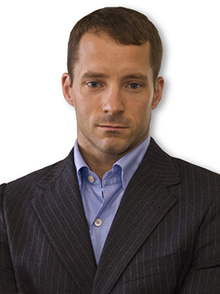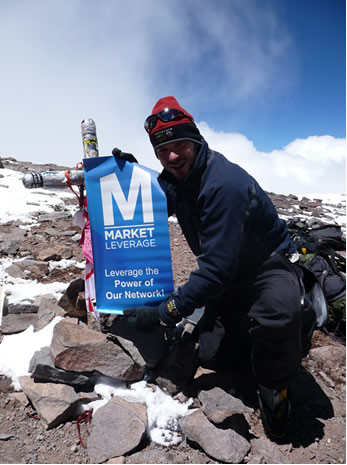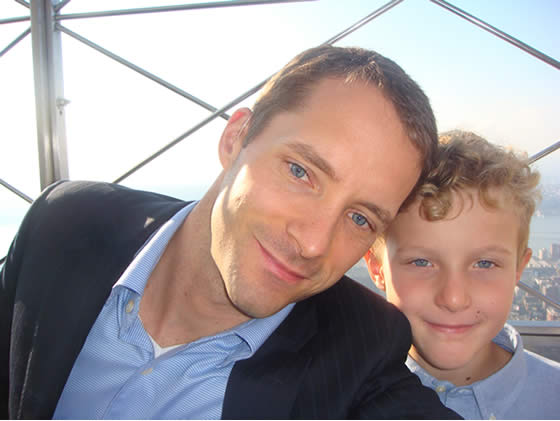
- Learn where Michael Jenkins thinks the affiliate industry is going
(hint: its the tip of the iceberg) - Find out how Market Leverage handles fraud and international affiliates
- See how they handle FTC issues
Full Interview Audio and Transcript
Personal Info
Hobbies and Interests: Marathons, Mountain Climbing, Parachuting, Philosophy, Family, Travel.
Sports teams: Currently doesn’t follow sports. In the past he liked, Orlando Magic and Baltimore Orioles.
Favourite Books:
- Managing Oneself (HBR) by Peter F. Drucker
- No-Nonsense Management by Richard S. Sloma
- A New Earth by Eckhart Tolle
Favourite Entrepreneurs: Andy Grove, Steve Jobs, Tony Hsieh, Reid Hoffman.
Twitter url: http://twitter.com/marketleverage
Company website: http://marketleverage.com
Fast Track Interview
Adrian Bye: Today, I am joined by the CEO of MarketLeverage. His name is Michael Jenkins. I have been hearing about Michael and MarketLeverage for years, and I have heard that they generate a tremendous amount of traffic. This is the first time I’ve ever talked with Michael, so I’m pretty excited about it. Michael, thanks for joining us. Can you tell us a little bit about who you are, where you come from, where you grew up, and what your past has been like?
Michael Jenkins: Sure. I grew up in Baltimore, Maryland in a very entrepreneurial house where it was normal to sit around the table and listen to my dad converse with people about business.
 I was 19 years old in my second year of college in Upstate New York when I decided that I was done with college and wanted to do something more. I moved to Daytona Beach, Florida thinking I was going to take over the world. I spent a number of years looking for an opportunity to fulfill my ambitions. Then about 10 years ago, I started PrecisionPlay Media out of a very small townhome; it eventually became known as MarketLeverage.
I was 19 years old in my second year of college in Upstate New York when I decided that I was done with college and wanted to do something more. I moved to Daytona Beach, Florida thinking I was going to take over the world. I spent a number of years looking for an opportunity to fulfill my ambitions. Then about 10 years ago, I started PrecisionPlay Media out of a very small townhome; it eventually became known as MarketLeverage.
Adrian Bye: Tell us about MarketLeverage. You’re a CPA network, right?
Michael Jenkins: Yes, we are. MarketLeverage was founded in September of 2004. With PrecisionPlay Media, our original business model, we had a very large rolodex of advertisers and publishers. Back when the company was started, few advertisers knew many publishers and most of the publishers didn’t know how to work with the advertisers, so we would bring these two parties together.
Then somewhere around ’03 and ’04, people began to take the affiliate marketing model and make it much more efficient with what we now call an affiliate marketing network. Eventually, we decided to start MarketLeverage to take advantage of these efficiencies.
MarketLeverage’s prime purpose is to push performance-based marketing in whatever direction that evolution takes it. Currently, affiliate marketing is the space we service now, but we think the idea of an advertiser paying only when they get what they’re looking for is much larger than affiliate marketing. We believe that the pay per performance model will transcend its current distribution model and will begin to affect all types of advertising.
Adrian Bye: Can you give me an idea of how big MarketLeverage is with employees and revenue?
 Michael Jenkins: Sure. We don’t disclose what our revenues are, but I can tell you that we have about 53 employees in our office space here in Florida. We’ve grown very dramatically over the course of the past three years. Last year, our revenues actually posted about $35 million to $36 million. We are pacing for greater than that this year, and we’re looking to continue that growth.
Michael Jenkins: Sure. We don’t disclose what our revenues are, but I can tell you that we have about 53 employees in our office space here in Florida. We’ve grown very dramatically over the course of the past three years. Last year, our revenues actually posted about $35 million to $36 million. We are pacing for greater than that this year, and we’re looking to continue that growth.
Adrian Bye: Let’s talk about having all of your employees in-house. A lot of people work in a very distributed manner. You’re purely an internet company doing a pretty advanced thing being in affiliate marketing, yet you have all of your employees in one location. I’m interested in your thinking as quite obviously you’ve had the opportunity to hire people who are not local.
Michael Jenkins: One of the issues you run into in affiliate marketing is that it is still very much the Wild West. One of our things has been to bring a degree of reliability, a degree of trust and high standards to both the advertisers and the publishers that we work with. I believe strongly that those values always win out in business. We felt the best way to do that was to create a great culture around those ideas and concepts because we know that our customers are best served by people who believe in the mission of the company.
One of our primary focuses has been to create a culture that’s made of the right people sitting in the right seats on the bus, to borrow an idea from Jim Collins in Good to Great. When a company assembles that group of people, it becomes evident from the outside. Our culture, which is built around expanding the pay per performance business model, is integral to how MarketLeverage services its customers better than we would otherwise be able to do if our employees were not working together in the same office space. Of course, there are challenges around having everybody here. It’s much more expensive to do it that way, but our bet is that quality will pay off in the long run.
Adrian Bye: One of the big things that happens a lot is employees learn a lot, build their relationships, then they leave, and start their own business. Do you feel that has been happening to you guys as well?
Michael Jenkins: We’re fairly strong with our Non Compete / NDA Agreements, and we are in Orlando. We’re not in New York City and we’re not out in The Valley. As a result, we don’t have as much geographic competition, which we think is an advantage.
But to be really honest with you, we know we can’t rely upon geography and legal documents. We try to take very good care of our employees. Most people here are paid significantly more than they would be down the street in another business in the Orlando area. We have incredible benefits. We buy people lunch everyday. We even have a Friday lunch where we buy beer for everybody and talk about the business. We are very proud of the fact that MarketLeverage was recently recognized by a large statewide business magazine as being the 9th best place to work in the state of Florida.
Our environment is very accepting, but at the same time, it holds people accountable to the values we believe in and to being good at what they do. I find that this challenges people, and there’s more of a family environment here. People don’t want to leave for a number of reasons, and one of them is because we’ve given people a fair shake, and we want to continue to do that. One of our favorite sayings is that "employees should not have to go home to be themselves".
Adrian Bye: Let’s say an affiliate wants to get started with MarketLeverage. Where do they get started?
 Michael Jenkins: The first thing I should say about MarketLeverage is that the network is not for all publishers. There’re so many people who apply to affiliate networks that really aren’t publishers. They’re people trying to put on the veil as a publisher and defraud advertisers. We figured that rather than playing that game altogether, we wanted to get solid evidence that somebody is who they say they are before we let them into the MarketLeverage Network. We’ve created a fairly proprietary process for doing that. When publishers walk through the application process, we make it a point to interview every publisher on the phone. You cannot get into MarketLeverage without speaking with somebody.
Michael Jenkins: The first thing I should say about MarketLeverage is that the network is not for all publishers. There’re so many people who apply to affiliate networks that really aren’t publishers. They’re people trying to put on the veil as a publisher and defraud advertisers. We figured that rather than playing that game altogether, we wanted to get solid evidence that somebody is who they say they are before we let them into the MarketLeverage Network. We’ve created a fairly proprietary process for doing that. When publishers walk through the application process, we make it a point to interview every publisher on the phone. You cannot get into MarketLeverage without speaking with somebody.
If you’re an international publisher, we require actual bank records and or bank references, and we confirm those. We do this to create a higher standard and to deliver better traffic to our advertising clients.
We find that good publishers, the ones we accept into our network, really love to work with MarketLeverage. We give them a tour of the network and show them how they can find top-performing offers. We learn what kind of publisher they are, what types of channels they publish in, whether it’s e-mail, search, etc, and we show them how to find offers in that area. Additionally, every publisher is assigned to a dedicated publishing manager that they can call or reach on AIM. Each publisher has a dedicated person who is really there to help them earn as much money as possible.
We do all of those things because we want to make sure advertisers are getting distribution through quality publishers who are well rewarded for their traffic. For many years in affiliate marketing, it was all about volume, volume, volume. Unfortunately, there are networks that will accept very low quality, potentially fraudulent publishers with high volume. When the publisher causes either a financial problem with an advertiser or a legal / compliance problem the network will kick them off only to sign them up again under a new name. This is the kind of thing MarketLeverage will absolutely not let happen. While its true that we are able to deliver a substantial volume of leads or sales to our clients, our focus is to build volume one quality publisher at a time.
Adrian Bye: Do you want to tell us a little bit about the problems you’ve had with fraud?
Michael Jenkins: MarketLeverage is fortunate because we’ve had relatively few problems with fraud. Much of the reason for that, at least on the publishing side, starts with the publisher application, where we have put a lot of emphasis on screening.
We have a compliance team in MarketLeverage that’s over 10 percent of the business as far as the number of employees. We actually have two attorneys in-house. The beginning of the compliance process is having publishers complete their initial the interview. Outside of the interview process we have other ways of determining the quality of a potential publisher based on their industry history, web sites, and knowledge base. We also look at new publishers’ traffic for click-through rates and other metrics that appear unrealistic.
We also work in partnership with advertisers to determine if they’re seeing anything in their streams of traffic that’s not normal or a problem. Our belief is the advertiser is an integral part of fraud prevention. When they start to see problems, we want to hear about those problems as soon as possible so we can look at the publishers and make sure that they’re doing the right thing. We don’t run into a lot of problems with this, but we have to be very vigilant to keep that out of the network.
 One thing about affiliate marketing is that there’s no question that when you work on a platform where there’re thousands of publishers and hundreds of advertisers things can happen. When they do happen, we’re very serious about removing them. At the end of the day, it all comes down to the quality of the distribution stream and the leads and sales it generates. That’s what we get paid to deliver.
One thing about affiliate marketing is that there’s no question that when you work on a platform where there’re thousands of publishers and hundreds of advertisers things can happen. When they do happen, we’re very serious about removing them. At the end of the day, it all comes down to the quality of the distribution stream and the leads and sales it generates. That’s what we get paid to deliver.
Adrian Bye: What trends do you see happening in the industry at the moment?
Michael Jenkins: Compliance has always been important to us from the perspective of it’s the right way to grow a company, and we want advertisers and publishers to have a great experience with our network. The day is upon us where the FTC and attorney generals are really starting to take a much bigger look at compliance and are starting to focus in on our industry.
As a result, we have two responsibilities from a compliance standpoint. One is to be the network for people who want to be compliant. Compliant publishers should be paid more than non compliant publishers. If you think about the fact that CPA prices reflect the average value per conversion an advertiser buys, that means high quality publishers should be paid more as they are driving the top of the average. We want them to come to MarketLeverage, and we want them to be successful with us because our network rewards good publishers. Number two is help inform those who are making laws about how the industry really works. Unfortunately a lot of legislators don’t understand our industry. This is why our involvement with the DMA is important to us. It’s also one of the reasons why we co-founded the performance marketing segment of the DMA. It’s the birth of a lobbying effort to better inform people that are making legislative decisions about how the industry works and what the industry is capable of. The responsibility of organizations like MarketLeverage, who are committed to compliance and quality, is to spread that message to the people who are ultimately going to make the decisions from a legal and compliance standpoint.
Adrian Bye: When you talked earlier about other directions that this space can go into, where do you want to head? Do you want to be brokering traffic for Best Buy?
Michael Jenkins: We think that the performance marketing space, driven by the idea that an advertiser only pays when they get what they’re looking for, is the seed of a revolution. It’s changing the way marketing is done, and we don’t think this is going to stop with affiliate marketing. Affiliate marketing is the first channel that adopted CPA widespread but it’s not going to be the last.
We think that pay per performance model is bigger than the affiliate marketing space. The primary problem with the affiliate space is that it’s difficult for brand conscious advertisers to control where their ads appear. This is a no go for many large companies. When software gets better at placing a specific ad in front of a specific person, the three Rs – the Right message to the Right person at the Right time, we think the model that allows a highly brand conscious advertiser to pay CPA with confidence will overtake the CPM and CPC models so prevalent today. I believe that all of this is imminent.
MarketLeverage is a real believer in this concept we call digital dialogue. The digital dialogue is the virtual voice of the consumer, heard through each click, each abandon, each sale, and each action a consumer takes or fails to take. These tiny communications must be harnessed with the performance marketing model and rigorous compliance efforts to create an environment that a brand conscious advertiser can achieve ROI consistently and safely.
Is it highly conceivable that companies like Best Buy are going to want to pay only when they get what they’re looking for – the CPA model? Absolutely, it is. Can they venture into the affiliate marketing space as it exists today and do that safely? At best, in very limited areas. Will the markets open up so that this can happen? Absolutely, and this is something that we focus on a lot. We have some internal efforts right now to build distribution that keeps the integrity of the brand message through the affiliate marketing space.
One point that needs to be made here is when you say to a publisher, "You’re only going to get paid when the advertiser gets what they’re looking for and here’s the creative," it’s tempting for that publisher to change some aspects of that creative to create a higher commission. This is where a lot of the fraud comes in. We think controlling this message is very important, and you’re going to see more control in order to capture brands like Best Buy in the future.
Adrian Bye: Is there anything that you want to talk about that we haven’t covered?
Michael Jenkins: The message I want to leave is that a thousand years from now the DNA of what we’re doing today is going to still exist in marketing. The idea that an advertiser can only pay when they’re getting the results they’re looking for, that they are freed from paying merely for the privilege of advertising which is the CPM billboard, television, radio, magazine model is guiding this tremendous evolution. Figuring out how to make all of this work is the battle MarketLeverage is engaged in. It’s fascinating. There’re a lot of great companies in our space that are engaged in the same thing, and we’re seeing the birth of something great.
Additionally, there’s a lot of focus now from the FTC and regulators, which is telling us that this is the dawn of much bigger money coming into this space and that brand marketers need a clean space in order to feel comfortable engaging in pay per performance marketing through affiliate marketing and through other channels. This as a very exciting time for the industry.









